Distinguished
Reporting
Award
The alternative Balkan postal system
published by Kosovo 2.0, Kosovo
It’s still dark while I go down to Petrarkija Street, toward the Music Academy, disoriented and confused with the reality of the early Sarajevo morning. From the bell tower of the cathedral, right there around the corner, six o’clock rings out.
With the last toll of the church bell, the irritating sound of a Viber call pierces my sleepy mind. What is it now? I pick up the phone.
“Hey, where are you?”
She sounds angry.
I glance at my phone: 6:02. Damn cathedral. Is it possible God slept in this morning too?
“What’s the problem? I’m only two minutes late!” I say, getting angry myself. “We aren’t in Switzerland!”
At that moment I see her below — right at the corner of Štadler and Pehlivanuša, where we’d agreed, as she squats in front of her car. She spots me too. We both put our phones down. “Hajde, hurry up!”, she calls to me.
Rada doesn’t like when passengers are late. And not because she can’t be patient. When her job requires patience, she will wait, even for hours if she has to. But not today. Rada has a very tight schedule. At 6:05, just above Parkuša, we pick up a package. Dobrinja, 6:25, a young guy is waiting for us, he’s going to work in a hotel on the Albanian coast. Then at 6:30, in the Mojmilo neighborhood, across from the King Fahd Mosque — the biggest in Sarajevo, a gift from Saudi Arabia — we pick up a doctor. An upstanding woman, she often takes this ride. And then towards Pale, from where Ivana, a programmer, is heading to Belgrade for a work meeting and a family visit.
Rada knows that if I’m two, three or five minutes late, everyone else will need to wait at least that long, or perhaps longer, if we get caught at a traffic light. And Rada hates for her passengers to wait. Those awaiting her passengers and those who aren’t awaiting passengers but rather the packages Rada carries with her, which are usually not any less important, also hate to wait. Above all, Rada wants us to reach the Drina River and cross the border before traffic gets bad, which starts around 8:30. If we fail, all these people will wait a lot longer.
“You get it now, what the problem is?” she asks brusquely, after giving me an in-depth rundown of the situation as we blast down the empty Tito Street toward Marin Dvor at the speed of light.
I’m a bit ashamed.
“But what are you gonna do? We’ll get there,” she says. “How are you? What’s new with you? How’s your mother?”
***
Since she started taking passengers between Sarajevo and Belgrade 20 years ago, Rada has been performing an additional, but no less important, transport function, working as part of an informal postal network. She transports anything anyone wants to send, as long as it’s legal and can fit in a car. In most cases it can.
“One time a woman came up to me in Belgrade, she’d bought everything you can imagine, just walked into shops and started filling her bags. Gimme this, gimme that. She brings two huge sacks and asks, will there be enough room in the trunk? I take a look and on top of one of the sacks sits a giant bag of popcorn. Well, alright ma’am, I think to myself, do you really need to send the popcorn too? There’s popcorn in Sarajevo! But what can you do, she is sending it to her mother. We’ll find the room!”
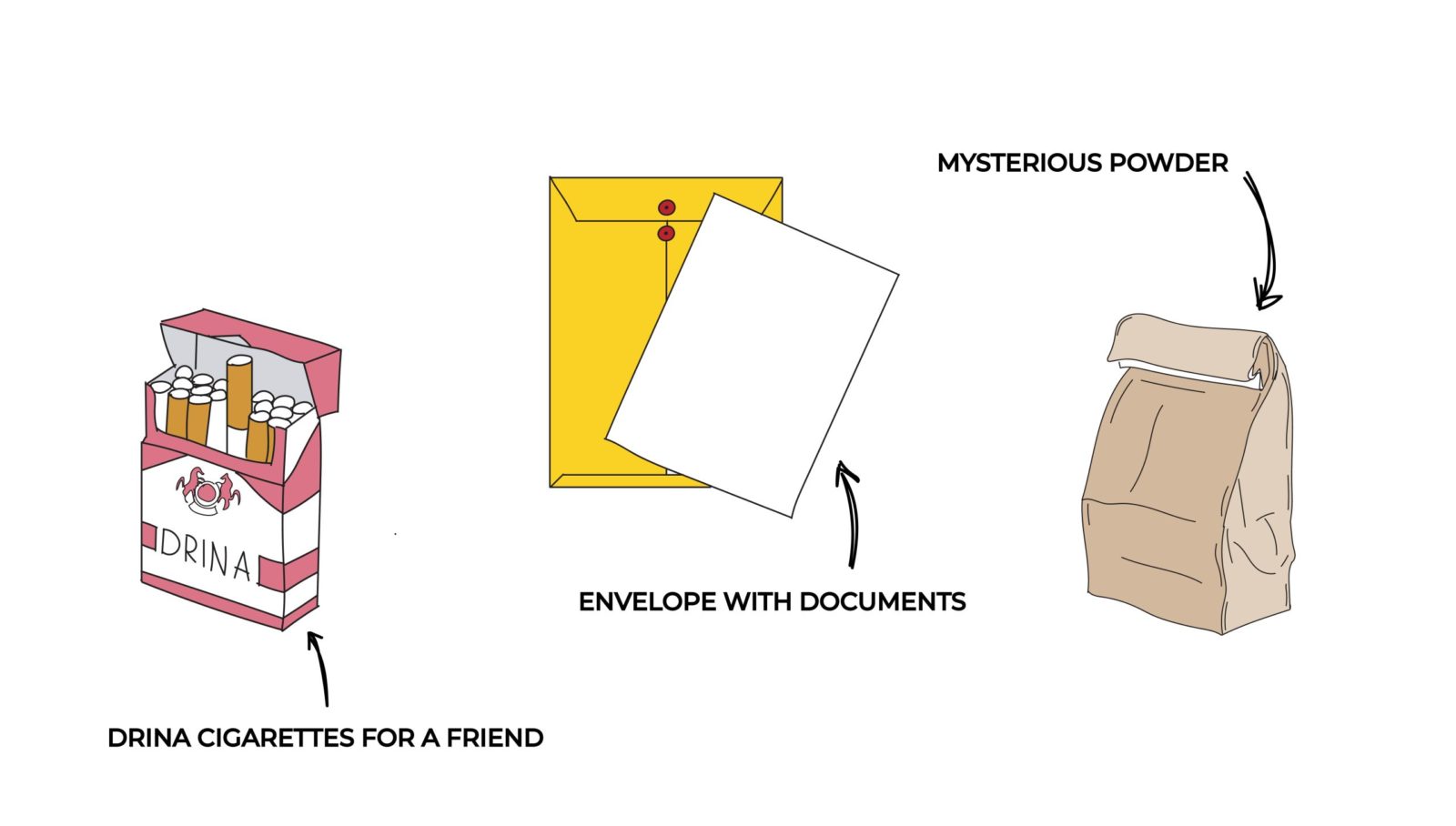
This time around, it’s not just Rada on the job. My bag is also full of packages. I’m bringing a carton of Sarajevo’s Drina-brand cigarettes for a friend and the night before I was given an envelope with documents — what they are or who they’re for I don’t know, but it’s important that they arrive in Belgrade as soon as possible — as well as a pouch full of some strange powder with big chunks and a coarse texture. The man who handed me the pouch said the name of the substance but I didn’t understand what he was saying. Then he repeated it. I still didn’t understand but I decided to pretend I had. Now I’m wondering if it’s legal. I hope it is. He looked like a fine guy. The person who put us into contact to hand the package off also seemed fine. At any rate, better not to mention this to Rada. If there is room for the popcorn, there must be room for my weird powder.
***
A leap of 300 kilometers in distance and a few months in time, into a bustling spring afternoon at the Belgrade bus station.
With broad strides I head toward the hall of ticket counters. My steps grow tighter; the narrow hallway between the counters and the departure platforms is packed with passengers, suitcases, shouts, rushing, confused looks, hugs and kisses.
Amid the commotion, my eyes are drawn to an old analog station clock. The long white hands show a calming sight: it’s 15:49. I love it when I arrive early, even if it’s just one minute.
At that moment, my phone rings. “Where are you?” He doesn’t sound angry but it does sound like he arrived before me, and on time. I start saying that I was the one who came early, but then I glance at my phone. It’s 15:52. Oh God.
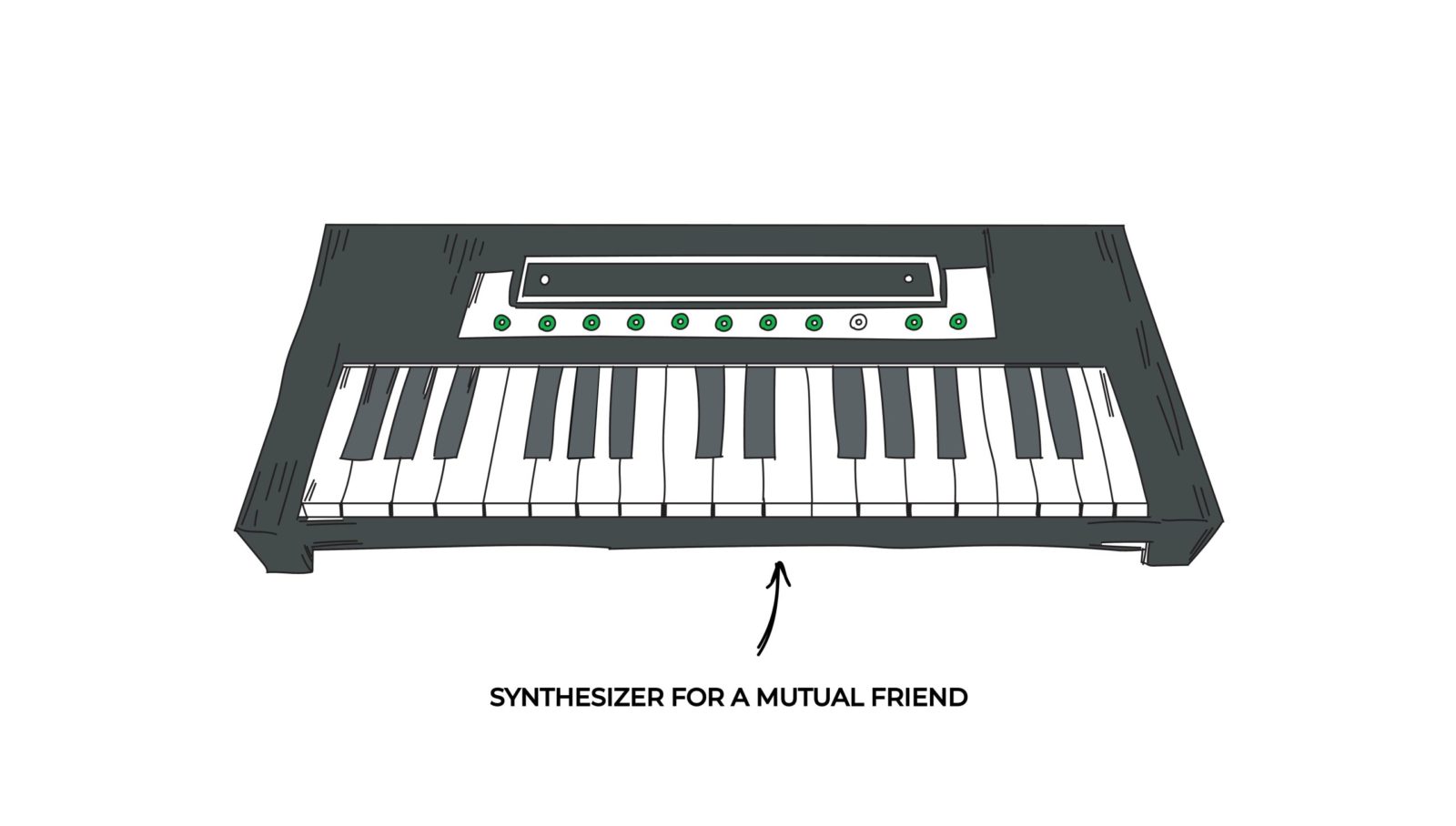
We meet at the entrance to the platform. We don’t know each other but recognize each other easily. He is holding a large box with a synthesizer inside, a package I need to deliver to a mutual friend.
I take the box. “Okay, that’s that,” and we part ways. I’m a mailman on an important mission and I don’t have the time to waste on courtesies. I run to a counter and buy a ticket.
Outside, at platform number four, the bus for Prishtina is filling up.
***
I started my “job” as a mailman in autumn 2020, when I first began traveling between Belgrade and Prishtina so often that people started noticing, and for people to notice it’s enough that you’re traveling more often than, well, never.
And so one day I got a call from a friend I hadn’t spoken with for a while but who somehow knew about my recent travels. A family from Prishtina was on vacation in Belgrade and their daughter had left her doll behind when they returned home. While the weather map on Radio Television Serbia shows Prishtina as part of Serbia, as far as the Serbian postal service is concerned, this city doesn’t exist, just like other places in Kosovo where Serbs aren’t the majority. Private delivery services are way too expensive. The only way the doll could reach Prishtina was for somebody to take it with them.
Would you mind doing that? It’s not urgent. But, actually it is. It’s her favorite doll.
The next time, a request came from the other side: Hey, do they still have that Skenderbeg drink? Please pack two for me, I really miss it! Then, in Prishtina: It’s not easy to find film for analog cameras, and there’s that one shop in Belgrade where it’s not expensive. Can you bring me some? A few months later, on the list of my successfully completed tasks were vinyl records of Belgrade’s New Wave, a kilogram of dried sausage, the keys to someone’s apartment, and the books by Petrit Imami about the common history of Serbs and Albanians (happily, but ironically, they had immediately sold out in Belgrade).
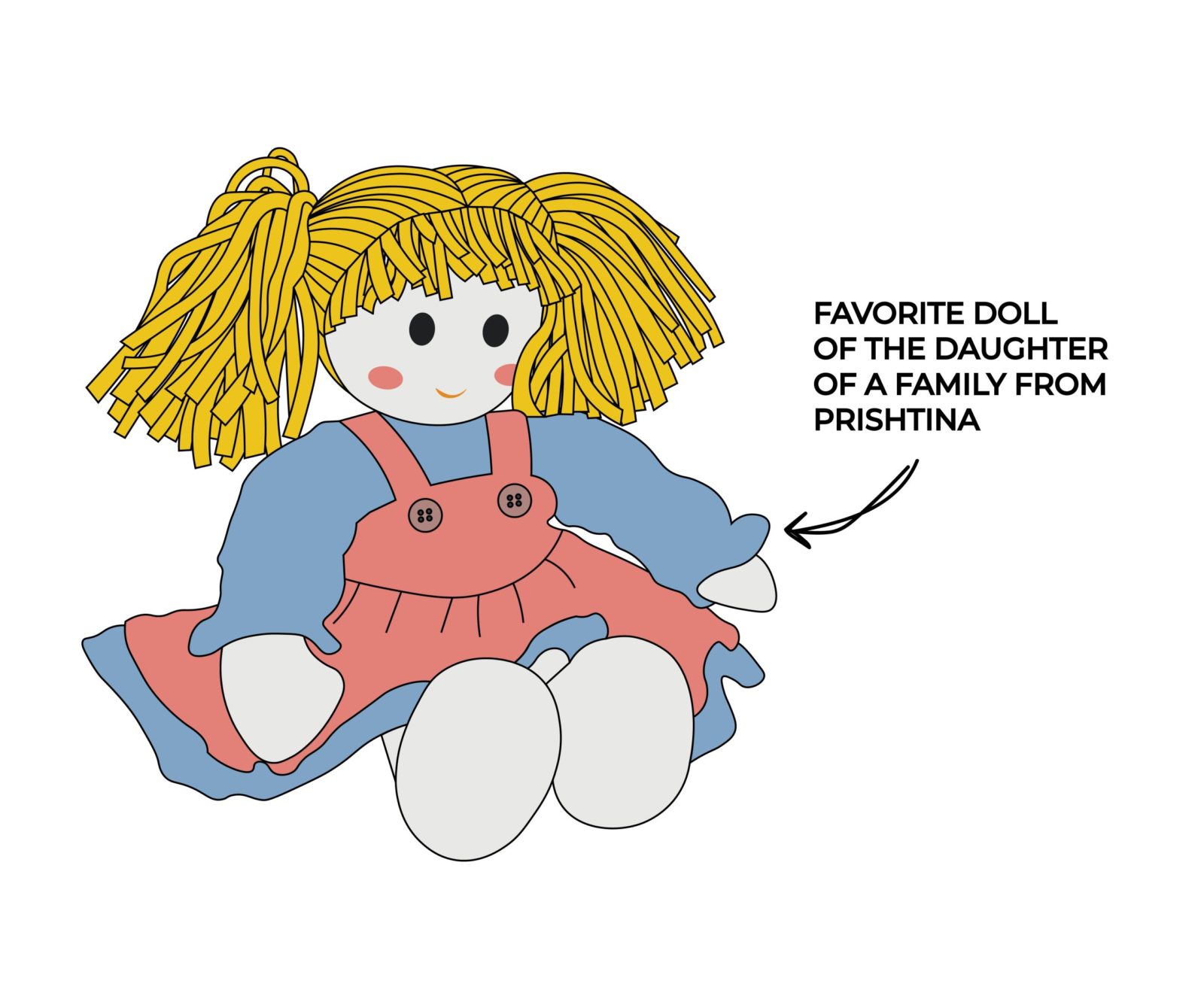
And that’s when I started noticing that almost all the personal exchange that exists between Kosovo and Serbia — between close family members, cousins and friends, between those who left, those who fled, those who stayed and those who were caught somewhere in-between — all this exchange depends on three buses that run day and night between Belgrade, Prishtina and Prizren, and on the small group of people who travel on these buses.
***
While the drivers in neat white shirts are hurriedly loading luggage, my attention is drawn to an old lady in black who is standing next to a giant plaid bag. It’s not clear to me how she got it here. She’s patiently waiting in line. She smiles at me. I think she likes me. We start talking.
“Where to in Kosovo?”
“I’m not traveling, son. I’m sending things to my family.”
I start to ask her what she’s sending them, but one glance at the enormous Chinese-made bag answers my question. It’s full of homemade food packed carefully into plastic ice cream boxes and large glass jars. Is that sarma? I also see an old plastic box of a brand of cheese from Sombor, wrapped in thick rubber bands so that whatever mystery it holds, perhaps a salad, doesn’t spill out during travel.
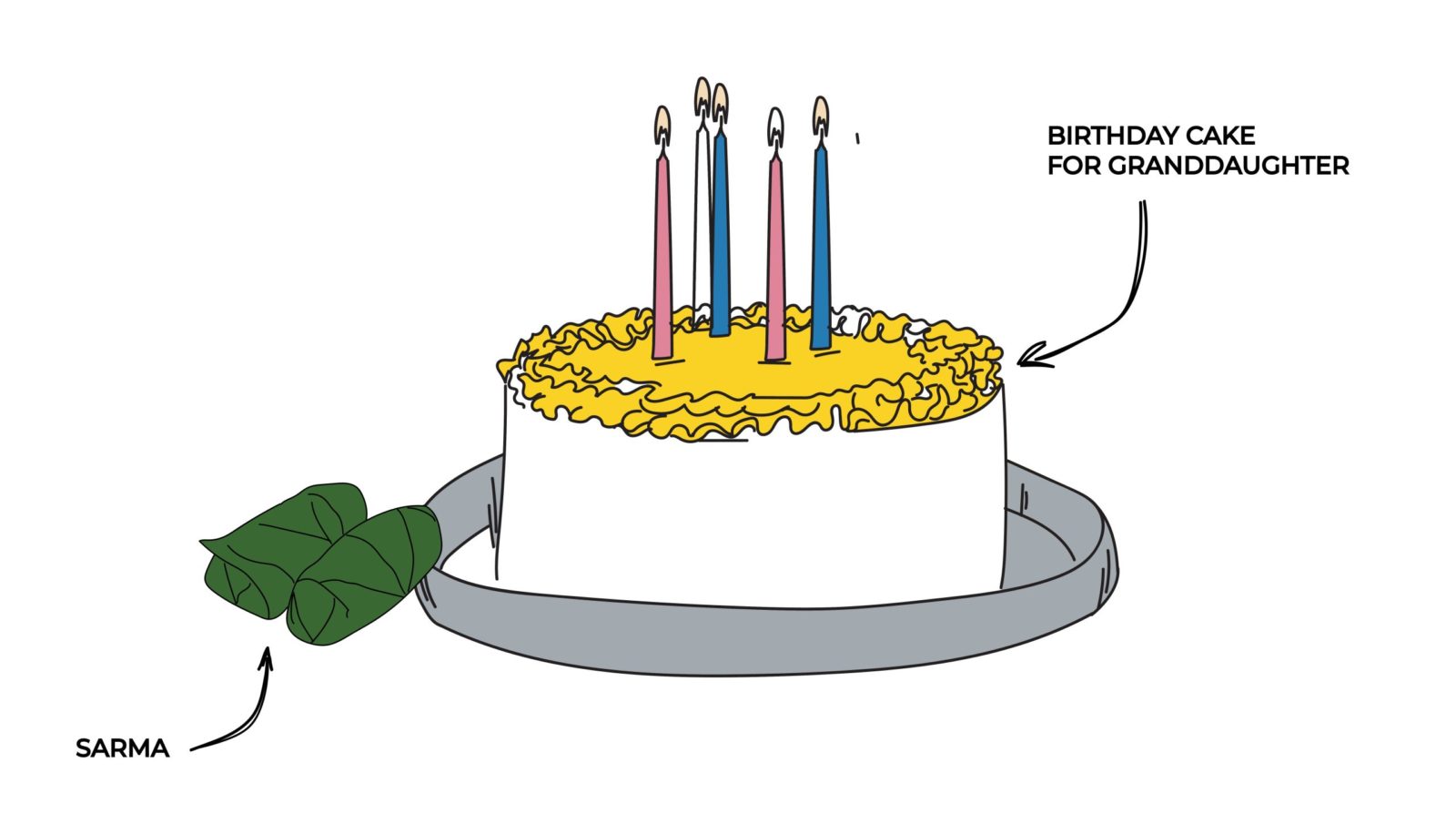
Her sister lives with her family in Gračanica, near Prishtina. She hasn’t stayed with them since corona broke out. She hopes to visit soon, perhaps next month, when she is done with some medical check-ups.
“Are you often sending things?”
“Not that often. They have food there, it’s not that they don’t. But they love it when I cook for them. Recently, my granddaughter celebrated her birthday. So, there is cake! It’s convenient this way, I just put it on the bus. Otherwise, it would be impossible.”
I stop and think how it would look at the counter in the post office to send homemade food. The serious face of the clerk looks you over through the glass. What’s in the box? A strawberry cake and sarma with dried ribs! How fast do you want it delivered? Immediately, so that it doesn’t go bad, you see how hot it’s been these days! Declared value? Priceless!
***
As I will find out through several trips and dozens of conversations with people who send and receive things across the Balkans, it’s not all just an issue of food and its perishability.
Uncle Pera is returning to Lipjan; that’s where his home has been for over 60 years. He had been on a visit to Belgrade. We are sitting together on a bus. Somewhere around the toll ramp at Bubanj Potok, I offered him some Plazma cookies. In return, when we stopped for a pause at a gas station somewhere around Pojate, he gave me a cigarette. I ask him whether he sends or receives anything from Serbia by mail. He decidedly says “no.”
“You never know with them! Two months ago, my son was looking for some car documents from a friend in Kraljevo. They still haven’t arrived.”
Uncle Pera clearly doesn’t trust institutions. And judging by the number of things that travel by bus everyday, he isn’t alone.
Sitting with the drivers in the semi-dark of a roadside cafe with the longing name of “Evropa,” I’m trying to figure out what everyone is sending. Most of the travelers sit outside waiting for the sign for departure.
“Are you trying to see if we’re carrying any drugs?” one guy asks me gruffly, as he offers me a piece of chicken he just pulled out of some aluminum foil.
He offered me chicken out of common courtesy. He asked the question out of open distrust. A journalist who writes about people who are sending stuff by bus? Why would anyone do something like that? And what does that exactly mean — are they sending some interesting things? What could be interesting there?
“Don’t worry, I’m not a police officer,” I tell him. I take out my journalist’s credentials. Afrim wipes his fingers and takes a look with genuine curiosity. A thought comes to me that people in this cafe have probably taken many things out of their pockets, but it is certain that this was the first time that somebody had taken out a card from the International Federation of Journalists. It seems to have some effect on him.
“What are people sending? Well, everything. Documents mostly,” Afrim says. “Paperwork for pensions up there, in Belgrade, for those who worked in firms before the war, for real estate, if somebody is selling something in Kosovo. Medicine. People also send money. Mobile phones, clothes. All types of stuff.”
“Do you sometimes experience any trouble?” I ask. Afrim gives me a sharp look. He again thinks that I’m a cop.
His colleague Edin enters the conversation: “It happens sometimes that people don’t show up to pick up their things. Or they ask us to wait for them someplace else… How the hell am I supposed to wait?”
“What happens with those things?”
“We return them to the agency and the sender goes to pick it up there.”
“Does it sometimes happen that no one picks it up?” I ask, imagining a magical antique shop, with various objects scattered around because people forgot about them over the years, each with its own history, ordinary and unusual story… Now, that would be something!
Afrim rudely interrupts my fantasy. “No, never. They always come. Come on, let’s go.”
***
Sending packages by bus or taxi, by driver, friend or acquaintance, is one of the most functional social inventions in the Balkans. It’s as fast as the speed of a car or bus. And in a place where railway and airline connections have been destroyed or simply canceled, it’s the fastest way to send or receive things.
One specific person — driver, friend or acquaintance — takes care of the delivery. It is a person you either know or at least met, someone you’ve shaken hands with at some point and exchanged a few words. It seems in those 30 or 60 seconds a level of trust is built that is so much greater than it’s possible to establish with any postal service worker, hidden behind the counter with their promotional stock photos of yellow vans that always arrive on time.
Who would you trust more, a company with a slogan that guarantees your shipment will be delivered in the next 48 hours, and which offers you the possibility to follow your shipment through a special code, or a driver who, when asked “when will it arrive, approximately?” — asked bashfully so as not to appear as if you are, God forbid, rushing him because he has every right to get there whenever he wishes — first looks into the distance, inhales a smoke, and exhales: “it depends on the rush hour, but not before nine”? And they always give you a time that’s too early. Better for you to wait, than for the whole bus.
Somehow, for an astonishingly high number of people in the Balkans, the right answer is B.
***
Finally, there is the issue of pricing.
When you send by mail, there are a number of relevant criteria. The weight of the object, its value and the distance and speed of the delivery. Postal websites and applications are filled with detailed tables and calculations enabling you to estimate the price down to the cent. With a calculator or without one, it’s often quite high. For example, to send a half-kilogram package from Serbia to Bosnia, without a return receipt, separate handling or air transportation, it will cost you around 18 euros. If you want to send that package to Kosovo via DHL, the price is around 50 euros.
But when you send it informally, that’s when you enter the field of a magical Balkan ritual, bounded by clear rules within which absolutely nothing is clear. When a friend or acquaintance takes a package, offering money for the service is like cursing their mother. An unwritten rule calls for inviting the helper to a glass of juice or coffee, but discreetly, to make it look like you aren’t inviting them only because they helped you out, but because you really want to get a drink with them.
At the same time, it is almost expected that they will reject the refreshment because neither of you has time nor desire for drinks. If the two of you wanted a drink, you would drink, without any packages. Though without that drink, you become indebted to the helper. Rest assured, if you ever do anything to displease this person, they will go around and say how they foolishly helped you when you needed it and this is how you repay them!

When it comes to bus drivers, things are a bit different. Every day, sometimes twice a day, they carry packages across borders, taking a risk (although, they often check what is inside; if it appears illegal, dangerous, or that it could break easily, they will refuse no matter how much money they are offered). They carefully keep track of what they are carrying and for whom and where people will await them. They write down names and phone numbers, call senders from dimly lit stops by the side of highways, arguing with people who are late or have simply forgotten to show up to pick up their packages.
To put it shortly, they expect you to pay them, and for good reason. But transporting things by bus isn’t quite standard, nor do the bus companies officially permit it, so there usually isn’t any official price list. It depends on what you’re sending and sometimes on the mood of the driver, but some charge the equivalent of a full bus ticket, others a half. Others allow you to independently set the price for the service.
And so we arrive at the precious social rule known as “However much you can give” (“Kol’ko daš”). As with everything else in this region, the rule isn’t what it claims to be. On the surface, you are free to independently assess the value of the service. However, what you are actually assessing is the assessment of the other side of the transaction, that is, how much money will it take so the other person is not offended. That’s why more often than not you pay more than the service is really worth.
All the same, it’s still cheaper than the postal service, and incomparably more fun.
***
We’re on a tight schedule but Rada allows for a quick break at the gas station because someone needs to go to the toilet. I use the opportunity to grab a cigarette, or rather, that’s what I wanted to do when I realized that I have none left. Luckily, I have a carton of Drina cigarettes that I brought to deliver to my Belgrade friend Bojan. He won’t mind.
The terms Drina and Sarajevo play a significant role in his life, and not just because of cigarettes. Bojan belongs to a small group of journalists in Serbia who have been bravely and consistently writing about Serbian war crimes in Bosnia of the 1990s. Every week, links to articles arrive in my inbox that, I fear, almost no one reads.
But Bojan isn’t giving up. He is currently working on a documentary about The Belgrade Circle, a not-so-small group of liberal intellectuals and peace activists that stood up against Milošević’s regime, wars and crimes in the early 1990s. Thirty years later not even a distant echo of their voices remains in Serbia’s political scene. It’s now just a memory in the heads of a small circle of devotees.
While we drive through Romanija, I feel like we are traveling through one of his stories. We pass through the beautiful nature of eastern Bosnia and see road signs with some of the most horrible toponyms from the war, places that many in Serbia have only heard about from Hague testimonies, as symbols of massacres, rapes, and ethnic cleansing. Here, just before Sokolac, that’s where we find the turn to Rogatica. You travel upward to reach Han Pijesak, then you go to Vlasenica, then Milići and Zvornik, and if you were to travel south from Zvornik, you’d reach Srebrenica.
Rada, a Serb refugee from Sarajevo, who fled the city at the start of the war, now lives in Pale, with a distinctly clear attitude about this topic: “We were lucky. Neither my family nor I were hurt by anyone, nor have we inflicted harm upon anyone.” If it were any different, I suspect that it would be impossible to do her job: “I went to Sarajevo immediately after the war. I have nothing to hide.”
Finally we reach the Drina River.
“I used to smoke Yorks from Rovinj,” Bojan tells me, “until all ties were severed with Croatia in 1991, so I switched to Drinas.”
Bad call, Bojan, because the ties with Bosnia didn’t last long either. He started smoking them again in the early 2000s in Sarajevo. Bojan loves Sarajevo; sometimes he just disappears there and comes back more alive than ever.

And why the heck am I bringing him Drinas, aren’t there any in Belgrade? Somehow, in March 2022 the 140-year-old Sarajevo Tobacco Factory, located in a country where almost a third of the adult population are passionate smokers, shut down. Old Drinas are still in stock though, and Bojan wants to smoke them as long as they last.
I wonder if we could claim the same thing for The Belgrade Circle. The anti-war idea in Serbia has broken down, and we have been smoking stocked goods for years. But they’re dwindling.
***
Gone are the days when the Merdare border crossing was a place where you expected problems, either as a Serb at the Kosovo checkpoint or an Albanian at the Serbian checkpoint. Nevertheless, as we approach from Kuršumlija, the bus somehow always settles down and the atmosphere becomes darker and tenser. There’s a feeling of sinister anticipation. Perhaps the scenes of desolation all around us contribute to that. Empty fields, empty streets, empty houses. And a completely empty road, which seems to lead to the end of the world.
Here and there, on signs along the road you see Albanian toponyms: Kastrat, Ljuša. The village Arbanaška is also nearby. But there have been no Albanians here for a long time. On a hill near Degrmen, two kilometers from Merdare, arise the dark ruins of Beć’s church, which was built starting in 1912 with money from Serb immigrants arriving from the Sandžak, Montenegro and Zubin Potok, who came for the lands of Albanians and Turks who fled to Kosovo after the 1876 Serbian-Ottoman War. Due to the poverty after World War I, work on the church was postponed for better times, which never came. There are not many Serbs left here either; the crumbling road to mythical Kosovo takes you through one of the poorest municipalities in Serbia.
The call echoes through the bus in Serbian and Albanian: “Prepare your IDs!” In honor of the mutual non-recognition of Serbia and Kosovo, for Kosovar and Serbian citizens, passports are invalid here. First, the Serbian policeman enters. In dead silence, he collects our IDs and carefully sorts them in his palm, and then goes out. After the check, the driver brings us our IDs back, but we get to keep them only for a minute, as it is now the Kosovar policeman that enters. The entire procedure is repeated.
All of a sudden, there’s a problem. The customs officer is lingering around the back trunk. He argues with the driver and shows him something. Passengers on the right side of the bus stare at him intently, and the left-side passengers stare intently at those on the right side because they can’t see the customs officer. What did he find? Will they let us through? Deeply buried fears rise to the surface. Suddenly, we know that anything is possible.
The driver shakes his head. The customs officer also shakes his head. It’s as if he doesn’t want to have to deal with this stuff. He slams the trunk door closed. I had the feeling that we all could breathe again.
We enter Kosovo. Now we begin seeing signs with Serbian toponyms, but no Serbs.
***
Belgrade, late May.
Lula greets me in the inner courtyard of an old villa in the center of the city. The street is packed with a hellish noon crowd. In the yard, full of delicate red and yellow flowers, there is complete silence.
Lula is just like that villa in many ways: elegant, sad and turned inwards. “I haven’t been out at all in a long time,” she tells me. “This is no longer my city.”
The letter and the bag were delivered to her neatly and on time. I decide not to inquire about the contents of theenvelope. I assume there was a reason that it was sealed. But I can’t bear to not ask about the bag of mysterious powder.
“Tarhana,” Lula smiles. “A soup mixture. My aunt Ešrefa from Travnik prepares this for me, and sends it through my nephew. They prepare it differently in Serbia. It’s good too, but I like hers. In Serbia, they usually say ‘tarana,’ as they don’t like that ‘h’ here because it was adopted from Turkish. Just like in Bosnia they started to insert it in places where it doesn’t belong.”
Lula has plenty to say about the packages that are sent between Belgrade and Sarajevo. Born in Sarajevo, she has been living in Belgrade since the end of the 1960s. She’s a person who, immediately after the beginning of the Sarajevo siege, collected and shipped humanitarian aid to the besieged city. She struggled for every shipment to reach who it was intended for. And she fought for thousands of them, shipments and people. “When I see cardboard boxes today, I feel nauseous.”
I leave her on the terrace of the old villa, carefully observing the flowers, while she slowly chews over the memory of a time when some resistance existed.
***
We are sitting in the restaurant Kraljevo, not far away from a big parking lot on Sarajevska Street in Belgrade, where Rada traditionally picks up and drops off passengers. Where else?
She spent the whole day in the car and is very tired but she finds the time to talk. She tells me how she has been fainting lately. The other day, she barely got in the car, but she didn’t give up. She transported her passengers and packages. She is receiving regular therapy now, and things will get better.
It’s a hot day. We order a light lunch, soups and cabbage salad. The tavern is empty and the waiter is bored, so he makes inappropriate jokes. Rada charmingly ignores them.
“Anyway, I have a story for you,” she tells me:
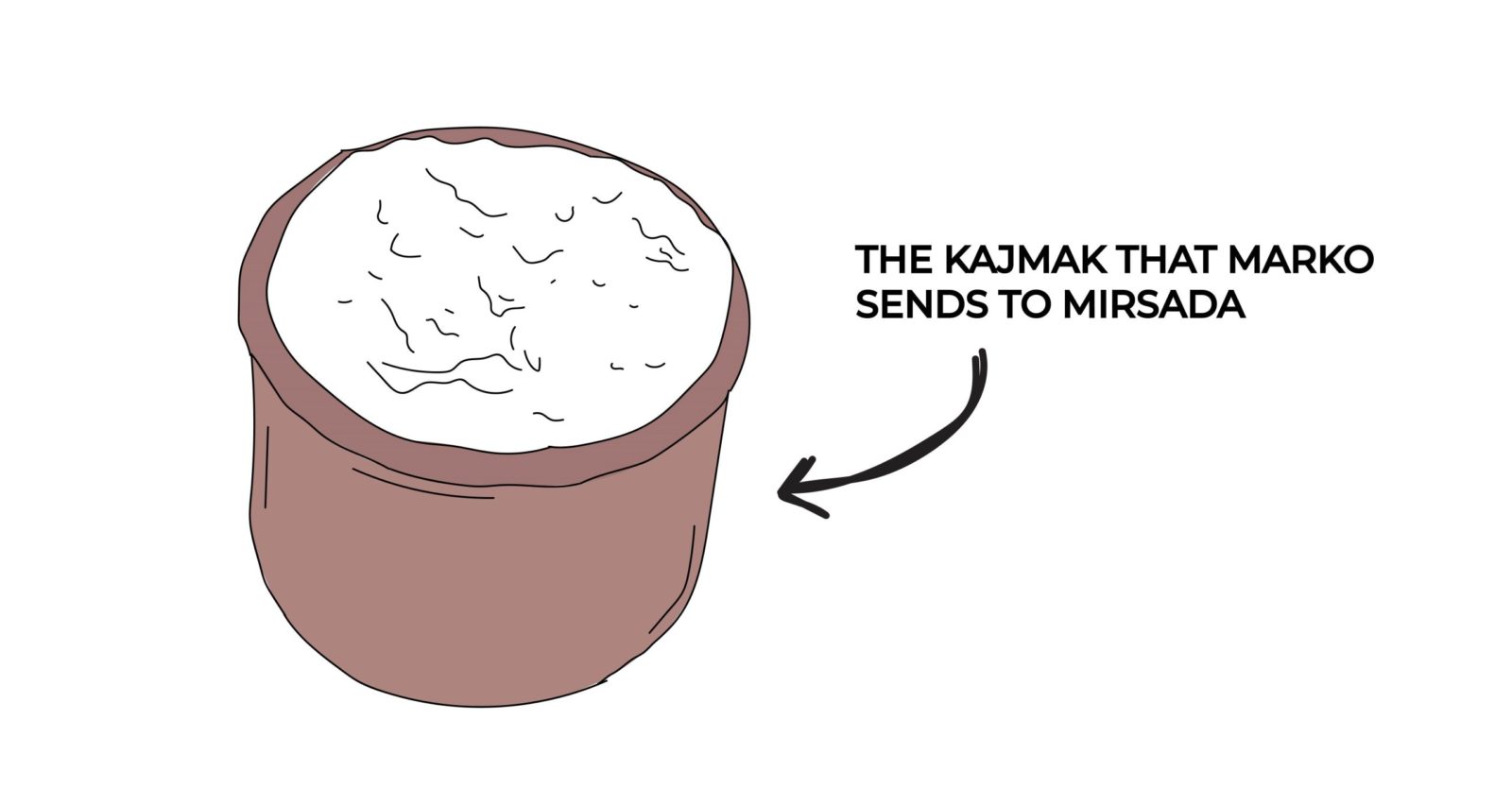
“In Sarajevo, there is this woman, Mirsada. She had a husband and a son. And the son had a friend, Marko, who didn’t have parents. She liked him a lot. So, anyway, Marko… Until then no one cared about what names people had. Normal people didn’t care about names. But that’s when the war started. She wondered what to do with him. Mirsada hid Marko in her house, so he wouldn’t get killed. She told me, ‘Rada, I kept him in the freezer. My child went off to the battlefield, and Marko was in the freezer.’
“She hid him until she found a person, somebody she could trust, so that she could get him into the territory of Republika Srpska, and then to Belgrade.
“And so, time goes by, and Marko becomes a very successful man. He starts a family, starts a business and everything goes flawlessly for him. And Mirsada, her husband dies, she stays with her son. And I don’t know the details, but somehow they got in touch with Marko. Imagine, after all these years…”
“And then,” Rada pauses, “then her son dies too. And Mirsada is left alone, and Marko becomes the only light in her life.
“Since then, since I’ve been working, he keeps sending her stuff. A bag of beans, peppers, walnuts, kajmak, a jar of honey. And he makes sure to send some money, 50 or 100 euros, but always with some food.
“So, I asked him once — Marko, my boy, you buy this food, and she has to go out and collect it and carry it back up to her apartment — wouldn’t it be easier for you to send her the money so she can buy it herself?
“He tells me, ‘Rada, I tried doing that but she is happy when she gets that box of kajmak and she can say — look at what my dear Marko sent me!”
And that’s when I finally got it. It’s not things that travel, it’s people. And only when people can’t, do they send things. But even then, in actuality, it’s not things that travel — but people’s feelings.
Editor’s Note: By request of the interviewees, some of the names in the text have been changed.






